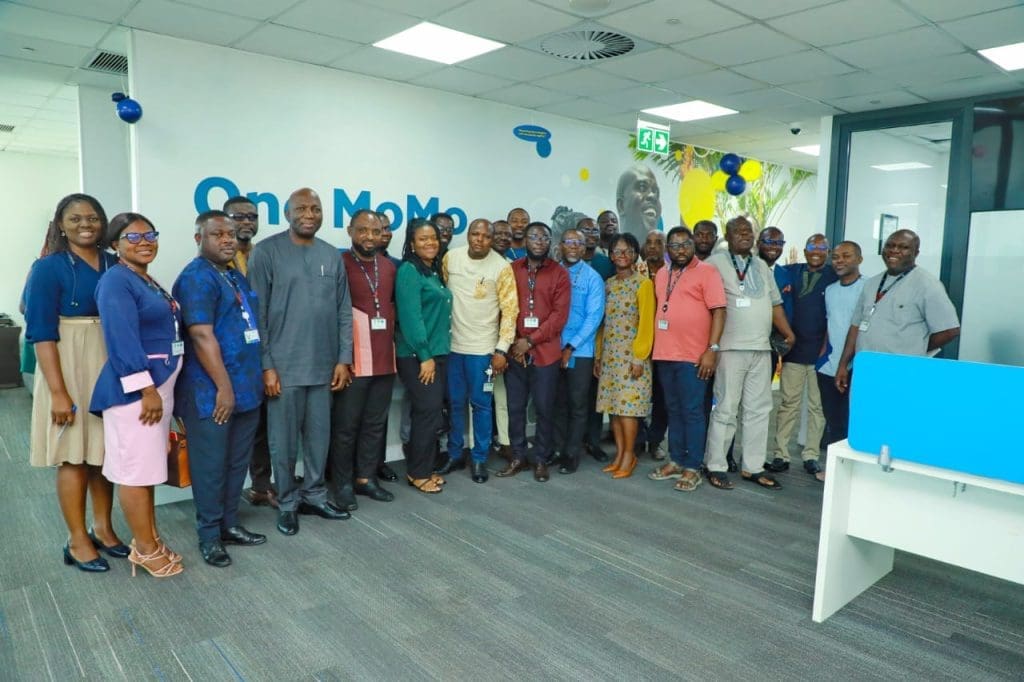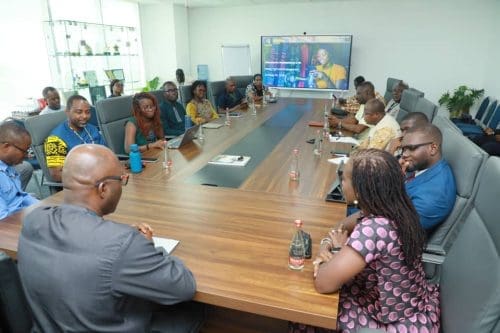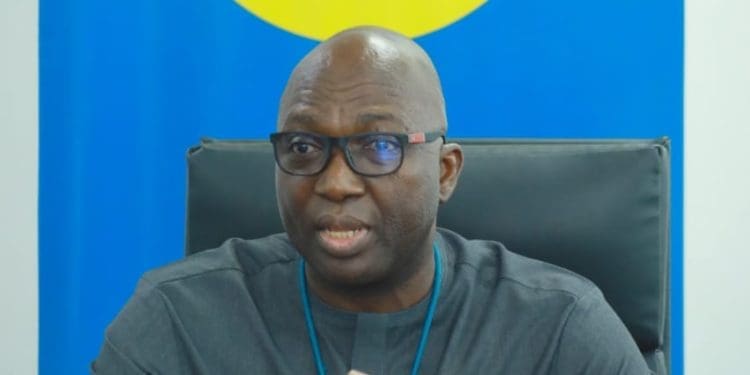Chief Executive Officer (CEO) of MobileMoney LTD (MML), a subsidiary of MTN Ghana, Mr. Shaibu Haruna, has called for a fundamental shift in Ghana’s financial landscape from a prepaid-dominated economy to a credit-driven system.
Speaking during a media interaction in Accra, he said Ghana’s economy remains overly dependent on cash and prepaid transactions, which restricts access to financial opportunities and limits the country’s ability to build a modern, inclusive economy.
“Many Ghanaians today have access to loans through our mobile money ecosystem, and we think this is a great platform to drive a credit-based economy.
“The goal is to make access to credit simpler, faster, and more reliable for everyone — from small businesses to individuals,” he said.

He revealed that MML is working closely with partner banks to expand access to digital credit products, including short-term loans, overdrafts, and Buy Now, Pay Later (BNPL) facilities, as part of efforts to democratise financial access and deepen inclusion.
“Very soon, we will announce new partnerships that will reach out to more customers, including small and medium enterprises (SMEs). The idea is to unlock more value for businesses while supporting economic growth,” he disclosed.
Driving inclusion through innovation and partnerships
Shaibu emphasised that MML continues to play a central role in Ghana’s digital economy by leveraging partnerships and innovation to expand financial access.
Through its evolving portfolio of services — including credit, cross-border remittances, and insurance for mobile money agents — MML is redefining how Ghanaians interact with money and financial services.
“Our focus is on building an ecosystem that supports financial empowerment,” he explained. “From enabling merchants to receive digital payments to allowing consumers to access credit, we’re creating a financial platform that drives participation and prosperity,” Shaibu stated.
While fraud and pricing pressures remain industry-wide challenges, MML’s investment in technology, customer education, and regulatory collaboration continues to strengthen the integrity of Ghana’s digital payments space.
Smart device affordability
Despite the progress in digital finance adoption, Shaibu identified the high cost of smartphones and devices as a persistent barrier preventing many Ghanaians from fully accessing mobile financial services.
“The device ecosystem is a complex one. “The price of a device is determined by multiple factors — taxes, costs, and the reseller’s margin. The real challenge is the tax burden on devices. In markets where taxes are lower, adoption levels tend to rise significantly, “he said.
He revealed that MTN has partnerships with Access Bank and other institutions on device financing to make smartphones more accessible to low-income users. However, uptake remains slow because of high prices.
“Device sales are a low-margin business, and if you can’t land them at the right price, it becomes difficult to scale adoption,” he noted.
Nonetheless, MML is developing strategies to encourage existing customers with basic smartphones to use a wider range of digital services while it continues working with partners to bring more affordable devices into the market.
Strengthening agents’ operational security
Mobile money agents form the foundation of Ghana’s digital payments ecosystem, and MML is investing heavily to protect their operations.
Shaibu disclosed that the company has introduced an insurance programme that covers agents against operational risks such as theft and robbery.
In addition, MML is encouraging agents to adopt security measures such as CCTV cameras for monitoring and deterrence.
“Our agents are the face of the business. “Their safety is directly linked to customer confidence and the sustainability of digital transactions,” he said.
Commitment to CSR
Addressing questions on CSR visibility, the CEO clarified that MML contributes extensively to the MTN Foundation — MTN Ghana’s unified platform for all social interventions.
“CSR interventions are executed through the MTN Foundation, which focuses on education, health, and economic empowerment,” he said.
“Even though you may not hear much directly from MML, our contributions go into the Foundation, which implements the projects.”
He added that through this approach, MML supports several initiatives that promote entrepreneurship, digital literacy, and youth empowerment across Ghana.
MoMo, data growth momentum
Shaibu reported that MTN Ghana’s performance across both its mobile money and core connectivity businesses remains strong.
“Last year, we saw acceleration in growth — both in mobile money and in our connectivity business, particularly driven by data,” he said.
“It’s important to note that while MoMo is growing, connectivity is also expanding at a similar or even faster pace.”
He emphasised that sustained investment remains essential to maintaining this growth trajectory.
“This industry rewards long-term investment. Returns are not immediate — you have to invest today and sustain it to see growth down the line,” he said.
Market Share and the role of third-party innovators
Although MML holds the largest market share in Ghana’s mobile payments industry, Shaibu noted that much of the ecosystem’s value comes from third-party innovators — payment service providers (PSPs) — that use MML’s Application Programming Interface (API) to build solutions.
“When a customer uses a POS run by a third party, the transaction still goes through our API, but the value is generated by that PSP,” he explained.
He said this collaborative ecosystem strengthens Ghana’s fintech space, drives innovation, and creates value across sectors.
Clarifying forex management in remittances
The CEO also clarified misconceptions about MML’s role in foreign exchange management for international remittance transfers.
“The remittance flow begins with international money transfer organisations or hubs, which send funds through the SWIFT system to local banks,” he explained.
“The conversion from foreign currency to cedis happens at the bank level, at approved exchange rates. We only disburse in cedis to the recipient through our platform.”
He stressed that MML’s role is limited to disbursing funds securely, while all foreign exchange management remains under the control of the banking system.
Ghana-Nigeria cross-border payment pilot
MML is also leading a pilot programme to test cross-border money transfers between Ghana and Nigeria, as part of a broader Pan-African effort to improve intra-African trade and payments.
The pilot — conducted in partnership with two other Electronic Money Issuers (EMIs) — is designed to test the operational and regulatory feasibility of cross-border transactions within Africa.

“This is a very controlled execution to actually test the urban remittance corridor,” an MML executive explained.
“It’s part of a broader discussion on improving African trade and payments under the Pan-African commerce agenda.”
He added that the Bank of Ghana has been instrumental in supporting the initiative, which aims to derive lessons for future policy direction.
MML is also working with another PSP, Bonafric, to expand the same Ghana–Nigeria remittance corridor.
“The goal is to make African remittances faster, cheaper, and more efficient — consistent with the objectives of the African Continental Free Trade Area (AfCFTA),” Shaibu said.
Similar models in East Africa have already produced positive outcomes, enabling seamless regional money transfers.
Strengthening media partnerships for financial literacy
Shaibu described the media as an indispensable partner in promoting digital financial literacy and building public confidence in electronic transactions.
“We have dialled up our consumer and stakeholder communication. Since June, we’ve invested heavily in public engagement, advertising, and awareness campaigns,” he announced.
He assured that MML would continue to collaborate with media houses to strengthen financial education, even as it manages engagements within available resources.
“We assess every media channel periodically to ensure value for investment, but we remain open to new collaborations that advance public understanding of digital finance,” he added.
Building a credit-driven, cash-lite future for Ghana
With its expanding ecosystem of credit, insurance, and cross-border remittance services, MML is positioning itself at the centre of Ghana’s financial transformation.
By championing a shift toward a credit economy, addressing affordability barriers, and working closely with regulators and innovators, MML continues to pave the way for a more inclusive, digital, and cash-lite Ghana.
“Digital finance is not just about sending and receiving money — it’s about empowering people. A credit-driven economy gives citizens and businesses the confidence to dream bigger, invest more, and grow sustainably.”













